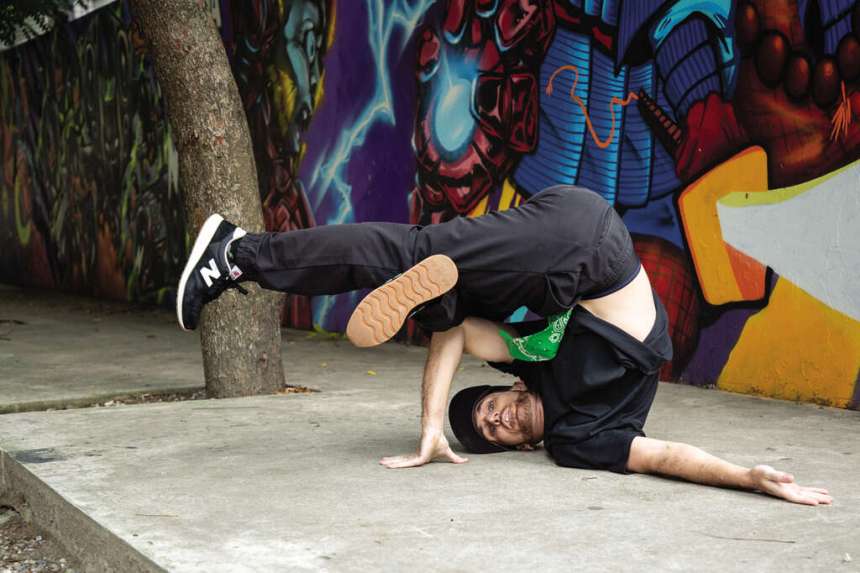WORDS BY Adam Hopkins PHOTOS BY Debby Wang, Boyz In The Hood
It’s no secret that many foreigners move to Taiwan’s capital every year; each one of them ending up here for their own unique reason. However, despite their differences in background and motivation, they all have one thing in common when they first arrive: they need to find a way to fit in, settle down and make Taipei their home. For 35-year-old Spaniard Krishna Palacio, it was his passion for breakdancing that helped him bridge the cultural gap.
BREAKING INTO TAIPEI
You would be forgiven for not knowing much about Taipei’s breaking scene, but Krishna assures us it is alive and well, and a subculture that is very much on the rise. Originally from Madrid, he has lived in Taipei coming up on three years. He has been dancing since the age of 16, and his style concentrates mainly on footwork — moves with an emphasis on the movement of the feet.

“I knew only a little bit about the breaking scene in Taipei but it wasn’t difficult for me to find out about it because breaking as a scene worldwide is not very big,” he tells us. “Breaking has really grown a lot in the last decade. If you’re active in the breaking community, you’re going to know a lot of people.”
As with a lot of things in life, getting your foot in the door in a new breaking scene is all about who you know. For Krishna, that’s exactly how he got started here in Taipei: a b-boy friend from the Philippines put him in touch with some Taipei dancers. After settling down in Taipei, he kicked of his dancing life by joining a practice with local dancers, who all welcomed him with open arms and minds, and even invited him to more events.
LIFE IN TAIPEI AS A PURE DANCE ADDICT
Krishna practices at least twice a week and competes in regular events and competitions, such as cyphers and jams, held on weekends in Taipei. While he especially enjoys the competitive aspect of breaking, he’s really been embracing the collaborative side of the art since coming to Taipei. Taking part in cyphers — informal gatherings where breakers will jam and dance together — allows him to mix with and learn from local dancers, and for him, that’s an extremely enjoyable and rewarding part of breaking in this city. “The most interesting thing is sitting with people, talking with people and seeing what they do,” he says.

Krishna also finds the distinguishing feature of Taipei’s breaking scene is that dancers seem to focus on technical skills a lot. Young dancers enjoy challenging themselves to pull off big and impressive moves, similar to those seen in gymnastics competitions, though keeping up with the power moves isn’t a big deal to Krishna. The language barrier, on the other hand, can occasionally prove to be an issue when interacting with local dancers. However, even if he can’t communicate so well verbally, Krishna lets his breaking do the talking when his words can’t. “It sounds like a cliché, but it’s true,” he laughs.
FROM THE UNDERGROUND TO THE MAINSTREAM
“Coming here and spending time with these guys has enriched me as a dancer,” Krishna admits. Every scene is different, whether it be Spain, Japan or here in Taiwan, and he has benefited hugely from being exposed to these different breaking environments where dancers and their moves are influenced by a variety of cultures and backgrounds. “Breaking is much more of a mainstream thing in Taipei than it is in Europe, for example,” he explains. While still very much an underground art form, in Taipei breaking is very popular with young people. High schools have dance clubs, where many forms of street dance are widely participated in, whereas back in his native Spain, or London where he also used to live, this isn’t the case. It’d be even more underground, so to speak.

“There’s a bunch of b-boys in Taipei who live professionally from dancing. They have schools. They can also make a living from dancing,” he reveals, somewhat to our surprise. But this just goes to show the popularity of the art in this city. Enough people are invested and engaged in breaking that opening a school to run classes and performances is a viable way to make a living.
Krishna likes to share tips at practices with those who are passionate. These days, he chooses not to make money from dancing out of principle. For him, teaching for free is equally, if not more, rewarding. Instead, he designs boardgames for work. It’s a different type of creative expression from breaking, but something he enjoys nonetheless. “At the end of the day, it’s still creativity,” he smiles. He goes on to tell us that a lot of people in Taipei’s breaking scene have jobs that are a world away from dancing and hip-hop culture. One b-boy friend of his, for example, is an engineer. His crew back in Spain had a lawyer and a dentist.
Taipei lends itself well to breaking and street dance, and you can often find people dancing in parks and public squares. “I can dance pretty much everywhere in Taipei,” Krishna says, “and that’s how easy it is if you want to dance here.” In the whole Taipei City, Taipei Cinema Park (臺北市電影主題公園) in the Ximending area is a popular spot for breaking that Krishna frequents. Complete with murals, graffiti and people skateboarding, it’s a place that truly captures the feel of breaking in the city. It’s both known and unknown, in plain sight yet underground. It’s welcoming but with a slight edge to it — sort of like breaking itself. (Read also: A Day in Historic Ximen)

LOCAL STYLE, SERIOUS DANCERS
When asked about big names in Taipei’s breaking scene, one crew that quickly comes to mind for Krishna is Boyz In The Hood — a local collective of like-minded dancers who organize a lot of jams in Taipei, hold classes and are looking to grow Taipei’s breaking scene. He also gave a shout out to a b-boy named Bojin who runs a school and is doing a lot to sell breaking and hip-hop culture to a wider audience across Taiwan, as well as less developed countries such as Nepal. Krishna championed the work of his Taiwanese peers and also the more mainstream nature of the art form here in Taipei which is allowing it to reach a bigger audience.
Despite its larger than usual popularity here in Taipei, breaking events still aren’t greatly publicized and your best bet to find an event to attend is by searching on Facebook. It’s one of those things, “If you’re in, you know,” Krishna enlightens us. However, one big meet to look out for this year is Boyz In The Hood’s ten-year anniversary event on October 11-12 at Gongguan Riverside Plaza (公館水岸 廣場) in Taipei Water Park (臺北自來水園區), which will include one-on-one battles, crew battles and more. You’ll even be able to catch Krishna himself in action.

A VISION OF THE FUTURE DANCE SCENE IN TAIPEI
Taipei, as a dynamic city, can be young and energetic, but at this point in Krishna’s life and career, he is concentrating on longevity: “I’ve been dancing already for 18 years and I want to be able to dance until I really can’t anymore,” he says with a grin. So, with longevity in mind, he looks set to be a mainstay of Taipei’s growing breaking scene for the next decade and beyond. This is a scene that, thanks to the current popularity of breaking with Taipei’s youth, will be healthier than it’s ever been ten years down the line.
There’s no doubt that breaking is already pretty big in Taiwan for something so underground, and it’s only going to get bigger. Given the size of the country and its population in relation to how many people know about and actively take part in breaking, the Taipei scene is fairly substantial. “There are dancers everywhere,” Krishna says. “People make a living from this, it’s professionally big and people know about it. You mention breaking and people know what it is.” One thing that the scene in Taipei has to its advantage compared to the likes of Europe or America is its compact nature. Taipei is so small that dancers can technically attend every jam if they are prepared to put in the effort.
Underground yet mainstream. Small yet big. Breaking in Taipei — and Taiwan as a whole — seems to be going from strength to strength and could one day help put the city on the map as a hub of dance, culture and expression. With breaking being talked about as potential event at the 2024 Paris Olympics, maybe one day we’ll see a Taipei dancer stand on the podium with a gold medal around their necks. Perhaps we’re getting ahead of ourselves, but watch this space nonetheless.
More stories in Taiwan:
If Only You Were in a Pair of Traditional Cloth Shoes: Dongtai Cloth Shoes Shop
This article is reproduced under the permission of TAIPEI. Original content can be found at the website of Taipei Travel Net (www.travel.taipei/en).











